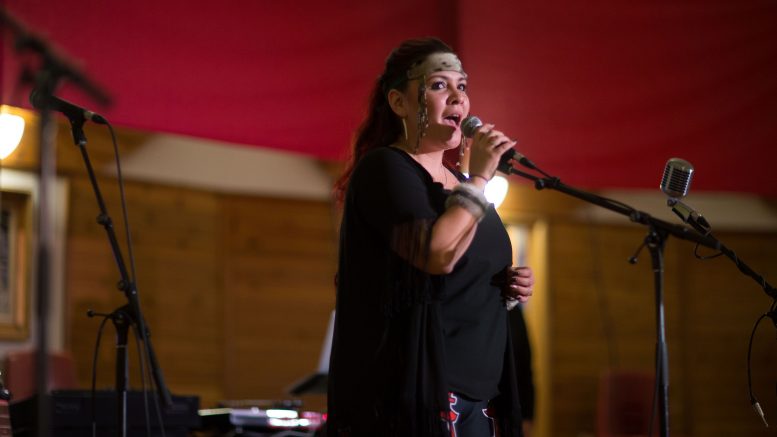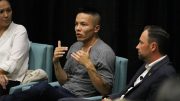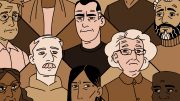Indigenous artists collaborated live for the first time at the Indigenous Voices Rising concert
on Oct. 18 at Circle of Life Thunderbird House.
Musicians Leonard Sumner and Moe Clark facilitated a collaborative show combining genres
that ranged from blues to throat singing.
“The intention was thinking about being in a circle, finding ways to help everybody express their
gifts and talents and in doing that, finding ways to support one another and back up one
another’s voices,” Clark said.
The concert featured DJ Boogey the Beat, producer Peshaanakwut Jeff Kinew, singer-
songrwriters waNda wilsoN, Ila Barker, Sonia Eidse, throat singer Nikki Komaksiutiksak, trumpet
player Chuck Copenace, and vocalist Rhonda Head. Each performer invited others to join them
on the stage during their two to four song sets.
It was a way of “meeting new artists and collaborating with them and not even knowing what
exactly we were going to be doing at first,” Komaksiutiksak said.
“But then the end product, it was just amazing.”
The day before the concert, the artists met for an afternoon work- shop focused on getting
their music out.
“The National Arts [Centre] is here in Winnipeg for a couple days,” Komaksiutiksak said. “And
they wanted to get local grassroots artists from Manitoba together to talk about the barriers to
going out there, exposing yourself and getting gigs.”
Komaksiutiksak, a local throat singer, has been performing for 25 years.
“It’s kind of special, but at the same time it’s like I wish there were more Inuit that lived here
and sang,” she said.
The National Arts Centre partnered with Manitoba Music to host the workshop and concert,
which was free to anyone that wanted to attend.
“We want people to be able to hear this music, we want stories to reach people, and I think the
best way for them to reach people and in this particular context is to offer a free, all ages
event,” Clark said.
Barker and Copenace agreed on the importance of hosting free events in the community.
“Especially to present a wide variety of indigenous artists that are out there, maybe ones that
many people maybe haven’t heard of and mixing that with people that eve- ryone has heard
of,” Copenace said.
Though the genres varied, a number of songs dealt with political and personal experiences.
Head performed her song “500 Years,” which deals with colonization and residential schools.
Barker recently graduated with an undergraduate degree in conflict resolution. She relates her
music to a class she took called “Non-violent Social Change” that opened her to forms of
protest besides rallies or pickets.
“There’s a fire in me to invoke change, and it took me a long time to realize that I could do that
just by doing what I love, which is music,” she said.
Barker said collaborative, “festival workshop” style shows are her favourite.
“I like to do that as much as possible because it creates a one-time experience for the audience
and for the artists,” she said. “And it’s something you will literally never experience again.”





